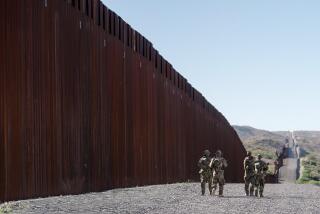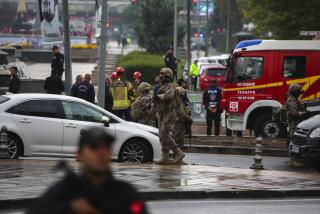Ethnic Discord : Kurds and Turks Play a Deadly Cat-and-Mouse Game at Border : Nature and politics conspire to thwart a permanent solution to the tensions.
- Share via
DARKAR AJAM, Iraq — Seen from a Turkish Blackhawk helicopter, the mountain border between Turkey and Iraq looks all but uncontrollable. Rugged peaks, deep ravines and mountainsides with more holes than a slice of Swiss cheese have for years provided perfect cover for Turkey’s die-hard rebels, the highly mobile guerrillas of the Kurdistan Workers Party, or PKK.
The latest and biggest anti-guerrilla offensive by Turkish troops may be coming to an end, with about two-thirds of the original force of 35,000 soldiers withdrawing from Iraq a week ago.
But the soldiers remain close by the border. More than 10,000 Turkish combat troops are still combing the valleys to disrupt guerrilla movements, to cut supply lines and to destroy equipment.
It seems pointless for a conventional army, no matter how well-organized and abundantly equipped with tanks and artillery, to hope for a decisive victory against irregulars holed up in the deepest recesses of inaccessible mountains such as these.
Some newspaper commentators see comparisons with the experience of the United States in Vietnam. But Turkish military officers do not view it that way. A confident commander in Darkar Ajam had no doubt that the PKK’s combat readiness had been damaged.
“They have fled,” said the general, who insisted on anonymity. No longer do Turkish Kurd rebels dominate the Iraqi Kurdish villagers living in the grim settlement of Darkar Ajam, relic of one of Iraqi President Saddam Hussein’s attempts to resettle his own rebellious ethnic Kurdish population.
Most Kurdish guerrillas left before the Turkish army advanced into a 25-mile-deep by 140-mile-wide border strip. The guerrillas abandoned camps on the Iraqi side of the border that are little more than caves and primitive shelters but that provided cover from aerial surveillance.
A couple of miles east of Darkar Ajam, the Turkish army showed journalists the destroyed Pirbela base, about 30 caves dotted on a steep hillside whose pretty shrubs and flowing streams hid a lethal array of mines.
One cavern was two stories high and was carefully explored by Turkish officers led by soldiers sweeping the ground with mine-detectors. Flour, packets of yeast and loose grains of rice lay scattered on the ground around the blackened remains of a fire. At the back, the PKK rebels had built a sandbag wall to isolate a room where they could sleep or study the lengthy outpourings of their Stalinist leader, Abdullah Ocalan, who is said to move between bases in Syria and Lebanon.
But the Turkish military success in pushing the PKK back may well be as short-lived as its many similar past incursions into northern Iraq. Although the military says it killed 505 PKK guerrillas during the offensive and captured a few dozen more, even the Turks estimate that another 2,000 to 2,500 guerrillas simply moved deeper into Iraq or fled to Iran and Syria.
The problem in northern Iraq is now in the hands of the Turkish government as it tries to negotiate a new border security agreement with local Iraqi Kurdish leaders. Diplomats say Turkey’s best hope is to breathe new life into a security deal signed with the Iraqi Kurds after its last major incursion in 1992.
Under that arrangement, Turkey was to have paid for Iraqi Kurdish fighters to patrol the border area. But the pact collapsed amid mutual recriminations when the two main factions in northern Iraq started fighting each other, creating the chaos and power vacuum that allowed the Turkish PKK to infiltrate the area once more.
Turkey is unlikely to set up a formal security zone on the Iraqi side of the border, diplomats say. The fact that Turkey is even having to try is ironic, since much of the area is a “haven” set up by the Western allies after the Gulf War to protect the 3.5 million Iraqi Kurds from Hussein.
In fact, Turkey’s ideal solution would be for a negotiated settlement between the Iraqi Kurds and the Baghdad government, allowing the Iraqi army to take control of northern Iraq once again. A Turkish delegation traveled to Baghdad again last month to test the atmosphere.
But while Hussein remains in power and in conflict with the United States, Turkey knows that it cannot push too far. Not only can NATO-member Turkey not afford to offend its main allies in Washington, it cannot take the risk of another mass Kurdish exodus to its borders as occurred after the post-Gulf War Iraqi offensive in 1991.
Turkey must also keep a weather eye out for Iran and Syria, whose borders with northern Iraq allow plenty of scope for plots to trip their rivals up. Iran has recently flirted with one of the main Iraqi Kurdish factions, and Syria is intensely suspicious of Turkey’s intentions in Iraq.
As a result, at least until Hussein falls from power or makes peace with the West, Turkish policy is in limbo. In the meantime, diplomats believe that Turkish commandos will keep up small-scale, cross-border raids. They will be keeping an especially close eye on places such as the Sindi and Shabaniye passes, which are well inside Iraq but also are main routes for PKK guerrillas moving up to the Turkish border itself.
Turkish Prime Minister Tansu Ciller has promised that Turkey intends to withdraw its troops completely--most recently to President Clinton in Washington last month. But she has repeatedly underlined that the Turkish army may well have to go back in again.
The U.S. government, despite initial expressions of concern about the safety of civilians and the length of Turkey’s presence in Iraq, has supported Turkey’s offensive against the PKK. During Ciller’s visit to Washington, Assistant Secretary of State Richard Holbrooke stressed that Turkey’s incursion into northern Iraq was not against international law.
But the U.S. Administration and European governments alike say military means alone will not solve Turkey’s problem with its 12-million-strong Kurdish minority, about one-fifth of the population. Ankara has come under increasing pressure to offer a political settlement that would provide a lasting peace, not only in northern Iraq, but inside Turkey itself.
“In a struggle with violent secessionists, force alone is not the answer; force alone can make a bad situation worse,” Deputy Secretary of State Strobe Talbott said during his visit to Turkey in early April. “The way to defeat outlawed groups is to deprive them of popular support by addressing legitimate needs and grievances. Inclusive democracy is the best antidote to extremism.”
More to Read
Sign up for Essential California
The most important California stories and recommendations in your inbox every morning.
You may occasionally receive promotional content from the Los Angeles Times.












